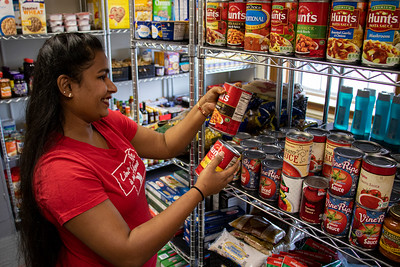It is important that all students at Nebraska are ready to learn, so basic food, housing, and broadband needs are important. Below are some resources available to students experiencing food or housing insecurity as well as information about broadband access. Emergency financial aid may be available to help students experiencing food or housing insecurity. If you are experiencing these issues, you can schedule an appointment with a Student Services Specialist in Husker Hub to discuss your situation. You can email at huskerhub@unl.edu or call 402-472-2030.
SNAP: Food Benefits for Students
SNAP (Supplemental Nutrition Assistance Program) is a federal government program that provides nutrition benefits to qualified individuals or families. During the COVID public health emergency, temporary student eligibility expanded SNAP benefits through summer 2023. Certain exemptions remain that may still allow some students to qualify for SNAP benefits.
Visit the federal SNAP for students website to learn more about SNAP benefits and exemptions for students to qualify.
To apply and learn more about SNAP benefits in Lincoln/Lancaster county, visit the Nebraska Department of Health and Human Services (DHHS). Apply online through ACCESSNebraska at https://dhhs.ne.gov/pages/accessnebraska.aspx. After applying online, a case manager will contact you for a phone interview.
You can also apply by calling the appropriate Economic Assistance office: Nebraska State Economic Assistance, 800-383-4278; Lincoln Economic Assistance, 402-323-3900; or Omaha Economic Assistance, 402-595-1258
After your interview, you will be issued an EBT card. If you are approved for SNAP, that card will be loaded with funding once all documentation has been received.
Note: You may be asked to document your eligibility for Federal Work Study. You can document FWS eligibility by taking a screenshot of your financial aid award screen in MyRED.
Husker Pantry
The U.S. Department of Agriculture (USDA) defines food insecurity as a lack of consistent access to enough food for an active, healthy life. It is important to know that though hunger and food insecurity are closely related, they are distinct concepts. Hunger refers to a personal, physical sensation of discomfort, while food insecurity refers to a lack of available financial resources for food at the household level.
The University of Nebraska offers a Husker Pantry location on both East and City Campus for all Huskers. Nearly 1 in 3 students on campus experience food insecurity. The Husker Pantry City Campus is located on the 1st floor of the University Health Center, room 123, and the East Campus Pantry is located in the Visitor’s Center, room 108B. The Husker Pantry will transition to an online, order-ahead platform beginning September 26, 2022. Customers can place their order online and select a pickup time and location after September 26, 2022.
Visit https://pantry.unl.edu/ to place an order, learn more about community resources, or discover volunteer and donation opportunities.

Housing Insecurity and Homelessness
Housing insecurity is the lack of security in an individual shelter that is the result of high housing costs relative to income, poor housing quality, unstable neighborhoods, overcrowding, and/or homelessness.
- Homeless Resources in Nebraska: http://dhhs.ne.gov/Pages/Nebraska-Homeless-Assistance-Program-Recipients.aspx
- People's City Mission: https://pcmlincoln.org/
- Matt Talbot Kitchen & Outreach: https://www.mtko.org/
Remote Learning Technology
If you do not have a personal computer to study, or a WiFi hotspot, you may request an increase in your cost of attendance (COA) for the cost of a computer or other hardware necessary to study. Increasing your COA permits the option of additional loans or other types of aid to cover such cost. A cost estimate or a copy of the purchase receipt can be submitted for review. To begin the review process to request an increase in your cost of attendance (COA), contact Husker Hub at huskerhub@unl.edu or by phone at 402-472-2030. Additionally, you can check out digital equipment from the University Libraries or Information Technology Services, if interested.
University of Nebraska Information Technology Services (ITS) requires Two-Factor Authentication for all students. Students need to have a Two-Factor device. Students who do not have a smart phone can request a hardware token from ITS. In addition, there is WiFi access available on campus.
Affordability Connectivity Program
The Affordable Connectivity Program (formerly known as the Broadband Benefit Program) is a federal program (through the Federal Communications Commission, or FCC) to help ensure households can afford the broadband they need for work, school, healthcare and more. The benefit provides a discount toward internet service for eligible households. Eligible households can also receive a one-time discount to purchase a laptop, desktop computer, or tablet from participating providers.
Note: The Affordable Connectivity Program stopped accepting new applications and enrollments on February 8th. Barring additional funding from Congress, April is expected to be the last month enrolled households will receive the full benefit. Consumers had to be approved and enrolled with a service provider by 11:59 p.m. ET on February 7th to receive the ACP benefit.
For more information about the Affordability Connectivity Program, visit https://www.fcc.gov/acp.